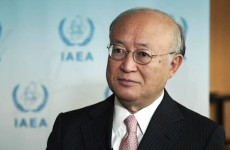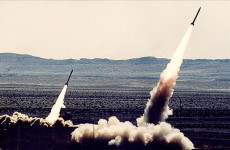Defense Minister Ehud Barak: ‘Confrontaing A Nuclear Iran Could Be More Dangerous & Bloody Than It Is Today’
Cabinet Minister Moshe Yaalon: ‘Israel Can Take Out Iran’s Underground Nuclear Sites – Iran Will Be Stopped One Way Or Other’
IsraCast Assessment: U.S. Defense Secretary Leon Panetta’s Warning That Israel May Strike Iran This Spring Indicates He Believes Sanctions Will Fail Or To Warn Iran That Israel Will Really Do It!
 No one should have any doubt about Israel launching a military strike to prevent Iran from acquiring nuclear weapons. That was the message loud and clear from Israeli civilian and military decision-makers who addressed the annual Herzliya Conference on Feb.2nd. Meanwhile in Washington, Defense Secretary Leon Panetta was quoted as saying there is ‘a strong likelihood’ that Israel will strike Iran as early as April. In addition, Israel has also disclosed that Iran has been working on an intercontinental ballistic missile capable of reaching the U.S.
No one should have any doubt about Israel launching a military strike to prevent Iran from acquiring nuclear weapons. That was the message loud and clear from Israeli civilian and military decision-makers who addressed the annual Herzliya Conference on Feb.2nd. Meanwhile in Washington, Defense Secretary Leon Panetta was quoted as saying there is ‘a strong likelihood’ that Israel will strike Iran as early as April. In addition, Israel has also disclosed that Iran has been working on an intercontinental ballistic missile capable of reaching the U.S.
Israel has told an international gathering at the Herzylia Conference: ‘If the international community does not halt Iran’s nuclear weapons project, we will and time is fast running out!’ Defense Minister Ehud Barak, a former IDF Chief of Staff, has obviously been overseeing the IDF’s contingency plan that has been perfected over the years. This is how Barak posed what could be a life and death question for Israel: ‘A confrontation with a nuclear Iran will be be complex, more dangerous and more bloody than it is today. Those who propose dealing later with the problem, may find that it will then be too late’. Several weeks ago, the Defense Minister spoke of any Israeli decision to go it alone was still ‘far off’. What is the conclusion? As reported previously by IsraCast, Barak believes Iran is trying to reach a ‘zone of immunity’ by acquiring the Bomb because this would deter any foreign intervention. However, there is another problem to which the Defense Minister has now alluded.
There is, what might be called, a ‘zone of the unknown’ that the Iranians may have already entered; they could now be secretly upgrading their uranium to 90% weapons grade. There are indications that Israel’s intelligence organizations have been leading the pack in trying to discover how close the Iranians are to getting their hands on atomic bombs. But if, as the U.S. now concurs, Iran is within a year or so of going nuclear will anyone know if and when the Iranians might make their nuclear dash? How long will Israel agree to wait sitting in the dark, if the sanctions do not permit IAEA inspectors access to all their nuclear sites? From Israel’s perspective the margin for error is now shorter; it’s no longer a matter of years but of months. Predictably, the Iranians have pulled their old ploy of offering futile negotiations that will lead nowhere, while they buy more time.
U.S. in Iran’s nuclear sights…

Likud Cabinet Minister Moshe Yaalon, another former IDF Chief of Staff, has now disclosed that the Iranians have been working on an intercontinental ballistic missile capable of targeting ‘Big Satan’ – that is the U.S. (DE- Israel is ‘Little Satan’ for which Iran already has operational Shihab rockets capable of carrying a nuclear warhead, if and when they become available). Yaalon disclosed that the missile installation, that was decimated by a mysterious explosion in November, was developing a missile with a range of 10,000 kilometers. (DE- It is reasonable to assume that if Israel knew this, it also informed the U.S. and this could explain the sudden dramatic shift since then in the Obama administration’s rhetoric. After first warning Israel in no uncertain terms not to attack Iran, U.S. Defense Secretary Leon Panetta later declared that Iran might acquire the bomb in ‘twelve months or less’. And in this vein, he did not rule out an American military operation. In diplomatic jargon, this was a tougher stance than the mantra of ‘all options are on the table’.)
Yaalon, who will have an influential say in any future cabinet discussion on attacking Iran, did not beat around the bush: ‘Iran must be stopped one way or the other from going nuclear!’ But what of those Iranian nuclear sites built deep underground? Speaking from his military experience Yaalon stated categorically: ‘There is no objective built by man that cannot be hit’. Whoever thinks that underground installations are impregnable, I suggest that he think again’. And he added that as long as Iran is not convinced there is the resolve to employ the military option against it, Tehran will carry on with its machinations as it is today. Therefore in the coming months it was necessary to combine a determined policy to isolate Iran diplomatically with stiffer sanctions to force the regime to decide between the nuclear project and its survival. Only such an approach could induce Tehran to act rationally.
Maj. Gen. Aviv Kochavi, the commander of IDF Intelligence Branch, disclosed that Iran now has sufficient low grade uranium that could be enriched for four atomic bombs. And if Supreme Leader Ayatollah Khamenei gave the green light, Iran could produce a nuclear weapon in one year; it would require another year to mount it on a missile.
What does it all boil down to? Despite all the hype about the EU oil embargo, the Iranians have thumbed their noses at it. For good reason, it only kicks in some six months from now. U.S. President Barak Obama has spent most of his term trying to ‘ engage’ Iran and is now scrambling for a viable fallback position while he runs for re-election.
So no wonder that U.S. Defense Secretary Leon Panetta ‘believes there is a strong likelihood that Israel will strike Iran in April, May or June- before Iran enters what Israelis described as a ‘zone of immunity’. This according to Washington Post columnist David Ignatius who also wrote ‘Prime Minister Binyamin Netanyahu does not want to leave the fate of Israel dependent on American action’. However the U.S. was opposed to such an Israeli military strike believing it would, among other things. ‘derail an increasingly successful international economics sanctions program’. If Israel, against Obama’s wishes, does decide to go it alone, some quiet supporters may be rooting in its corner – Saudi Arabia and the other Gulf states are just as concerned as Israel these days. On second thought, Panetta’s warning that Israel will be poised to strike Iran this spring indicates at least one of two things: that even the U.S. Defense Secretary does not believe the sanctions or the latest negotiations have any chance of success or to tell the Iranians that the Israelis will really do it!




